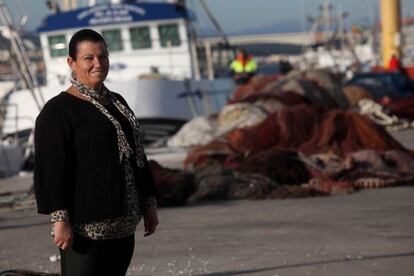Fishing sector "dead" in south, says new head of fishing guild
The head of one of Spain's largest fishing fleets talks about the changing industry She blames the EU's failure to extend a fishing agreement with Morocco as the cause

A year after the EU failed to extend a fishing agreement with Morocco, the head of one of Spain's largest fishing fleets says that the sector has no future, blaming the government and the EU. "The sector is dead, look around you," said María Oliva Corrales, the first woman to run the Algeciras fishing guild, speaking from the dock front of the port in Cádiz province.
"There was a time when there were so many boats moored here that by stepping from deck to deck you could cross from one side of the harbor to the other. Now, there are barely 20 fishing vessels here," says the 49-year-old, who took over at the beginning of the year after the former president of the guild stepped down. She will stay in the post for three years, "if the members want me to."
Corrales, whose family has fished in this area for three generations, blames Brussels and the Spanish government for not reaching agreement with Morocco on fishing quotas.
In December 2011, European Union lawmakers rejected a one-year extension of the bloc's fisheries agreement with Morocco, citing overfishing and interference with the resources of the Sahrawi people.
Brussels' decision forced some 70 Spanish ships to immediately leave the fishery grounds
The veto forced some 70 Spanish ships - from Andalusia and the Canary Islands - to immediately leave the fishery grounds.
According to Corrales, the veto was "the last straw" for the 15 vessels left fishing there.
"What we want is to fish," she says, adding that so far no news on the settlement of a new protocol has been received or news on whether the government plans to extend aid to fishermen.
The decision has forced Spanish fishermen to leave the waters off Morocco and Western Sahara, and is seen as a disaster by sector workers in Andalusia, says Corrales. The Spanish government has called for European money to support the affected fishermen. Most of Spain's fishing boats are based in Andalusia and the Canary Islands.
The collapse of the deal has dealt a clear blow in a region with a higher than average unemployment rate. More than six million people are now unemployed with no sign that the economy has bottomed out yet.
"Things were already bad. Now we are being thrown overboard," says Corrales.
Last month, Agriculture Minister Miguel Arias Cañete urged the Commissioner of Fisheries of the European Union, Maria Damanaki, to "quickly" negotiate a new fisheries protocol with Morocco for the Spanish fleet to return to the African waters.
"We are hoping the situation gets fixed quickly," Corrales said, adding that she did not know if there were alternative fishing grounds available. "I suppose the European Parliament must have a solution."
Last January, Spanish Prime Minister Mariano Rajoy visited Morocco, but failed to reach any agreement with the government there over the issue of fishing rights.
Corrales says matters have been made worse by the ongoing dispute with Gibraltar, and that life has been made harder for her members by the regional government of Andalusia's delay in announcing new fishing regulations.
In May, Spanish fishermen called for Civil Guard assistance several times after the Gibraltar Police tried to divert them away from waters around The Rock.
Fishermen in Algeciras say they are being prevented from fishing off Gibraltar in waters the British colony claims as its own under a 1999 agreement aimed at protecting fish numbers.
Gibraltar Chief Minister Fabian Picardo says fishing with nets in the waters around The Rock is outlawed under a 1991 European environmental law unless a license is issued.







































